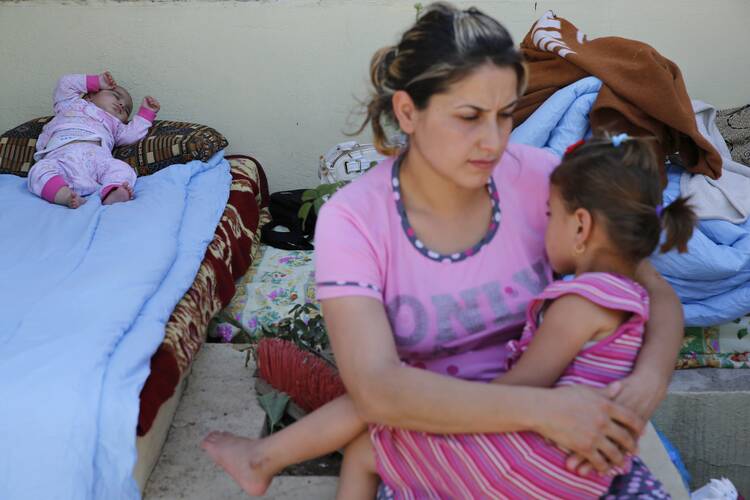Two Iraqi nuns and three orphans kidnapped in late June have been released safely, according to the Christian rights group Middle East Concern. The group, citing Chaldean Catholic Patriarch Louis Sako, said the five were released on July 14 without anyone paying ransom. They are reported to be in good physical health. They also said they were treated well during their abduction.
Meanwhile, Iraqi officials confirmed reports of mistreatment of Iraqi minorities in the areas controlled by Islamist militants of the Islamic State of Iraq and the Levant. The extremist group has taken over vast swathes of territory across five Iraqi provinces north and west of the Iraqi capital, Baghdad.
There has been no official statement on who kidnapped the nuns and orphans in Mosul, an area controlled by the militants.
The kidnapped Chaldean Daughters of Mary, Sister Miskintah and Sister Utoor, and three orphans disappeared June 28. They went missing around the time the militants shelled Christian villages outside of Mosul, including Qaraqosh, forcing more than 40,000 Christians to flee, many with just the clothes on their backs. The majority of Qaraqosh's 40,000 inhabitants are Syriac Catholics.
The nuns live and work in an orphanage attached to the Chaldean monastery in Mosul. The orphans were identified as Hala Salim, Sarah Khoshaba, and Aram Sabah.
Patriarch Sako and other church leaders continue to express concern for the future of Iraq's Christian communities. Other non-Sunni Muslim Arab communities in areas controlled by the Islamic State of Iraq and the Levant also have expressed fear for their future.
Middle East Concern said it has received reports in recent days of "atrocities against Yazidi communities, the appropriation of land belonging to Christians and members of other minority communities, and the further removal of statues and religious symbols."
Islamic State of Iraq and the Levant militants reportedly have occupied both Mosul's Chaldean Catholic and Syriac Orthodox cathedrals, removing the crosses at the front of the buildings and replacing them with the Islamic state's black flag.
The Vatican's Fides missionary news agency confirmed on July 16 reports that the militants instructed government workers to not hand out rations food and cooking fuel to all Christians, Kurds and Shiite Muslims in Mosul.
Workers ignoring the orders were threatened to be charged and prosecuted according to Shariah law, Vatican Radio reported.
Homes once belonging to Christians in Mosul were also being singled out and marked "with the letter 'N,' 'N' for Nazarat," which means Christian, Chaldean Auxiliary Bishop Shlemon Warduni of Baghdad told BaghdadHope, an Italian blog that posts news about the church in Iraq. The abandoned homes are then occupied by Sunni supporters of the caliphate, Vatican Radio reported.
There are many problems in the Christian villages in the North, which have welcomed people fleeing areas now controlled by the militant forces, he said July 16. "There's no infrastructure, especially for supplying water and electricity, and with it being summer, this is much more than a mere inconvenience." The villages received electricity from Mosul, but those supplies have been cut off.
The wells that the church is building along with UNICEF are not enough, he said, adding that as head of Caritas Iraq, he was launching an appeal for help in "alleviating these very difficult conditions for these people who in many cases have lost everything."
Meanwhile, Patriarch Sako wrote members of the Iraqi parliament, urging them to "waste no more time" and to quickly choose a president and prime minister to "save the country from the dangers of anarchy and disintegration." A functioning government is needed as well as a fresh push among all citizens to work together and include everyone in building the country's future, Archbishop Giorgio Lingua, apostolic nuncio to Jordan and Iraq, told Vatican Radio July 11.
"If there is the willingness to include everyone in planning the future of Iraq, well then those who invaded will lose local support. They came in very easily because there was so much discontent," he said.
As soon as all facets of Iraqi society feel represented in national government "then these (occupying) forces will lose support from the locals," he said.
Archbishop Lingua said "a miracle is needed" to keep the situation from deteriorating even further into armed conflict, and he called for prayers from all over the world.








